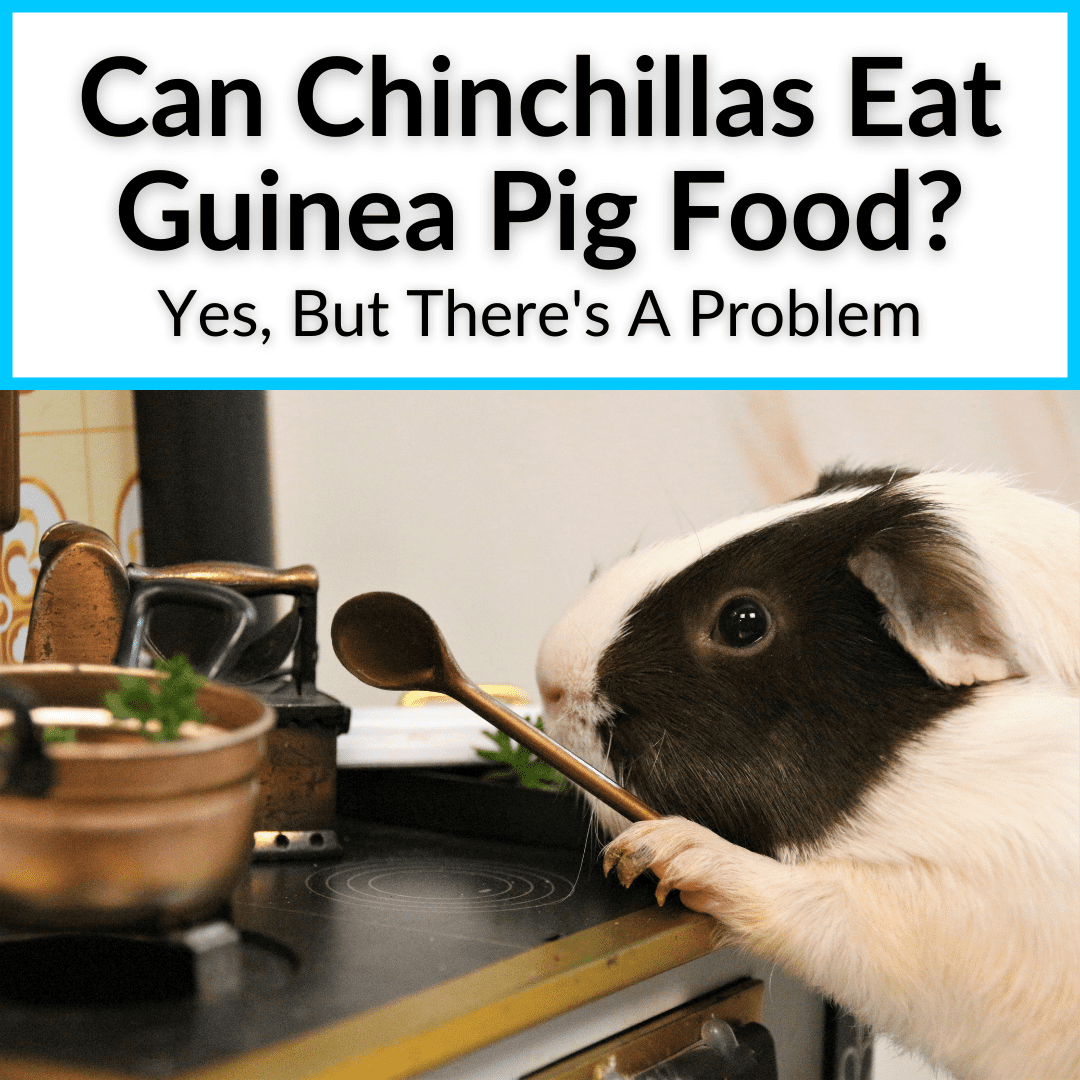
No surprise, since they are somewhat related.
So it only makes sense to wonder if chinchillas can eat guinea pig food.
It is much easier to find than chinchilla food. And many pet store employees will even recommend it.
But can you trust pet store employees?
The answer to that is no. It is rare to find one that actually knows anything about chinchillas.
Always do your own research. Or ask your vet.
And that is why you are here, right? So let’s get right to it. We’re going to cover everything you need to know about feeding your chinchilla guinea pig food.
Contents
Can Chinchillas Eat Guinea Pig Food?
You should not feed your chinchilla guinea pig food. Chinchillas and guinea pigs are quite similar and they both make great pets, but they have different nutritional needs.
While a chinchilla can survive on guinea pig food it is not ideal. It simply won’t provide all the nutrients chinchillas need.
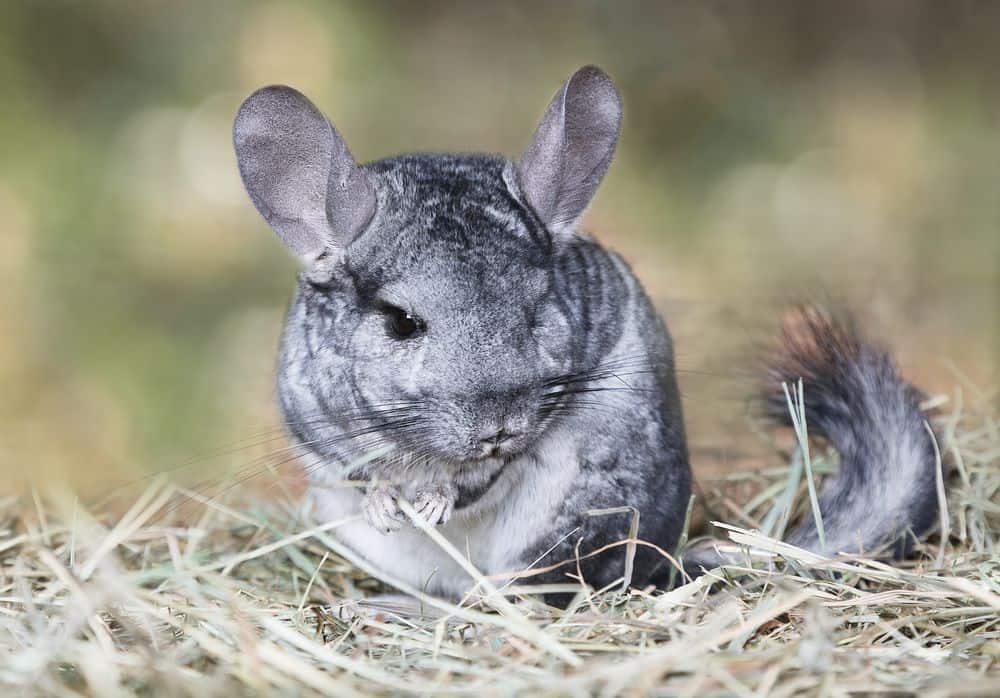
And chinchillas can not go long without food and the nutrients they need. Let’s go into more detail on why guinea pig food is not ideal for a chinchilla. We’ll also detail exactly what you should feed your chinchilla.
Why Chinchillas Should Not Eat Guinea Pig Food
Chinchillas and guinea pigs are quite similar to each other physically. They are both furry rodents and are actually distant cousins. They both come from South America and make excellent pets.
But as far as their nutritional needs are concerned, the two animals are very different. While they are both mainly herbivores (the chinchilla eats some animal protein and is thus an omnivore), each one has different nutritional needs.
If you feed a guinea pig diet to a chinchilla, it won’t die. But it also won’t receive the nutrition its body requires. It could suffer health issues, like an stomach upset, diarrhea, etc.
Commercial food pellets specially made for guinea pigs are fortified with vitamin C. That’s because these small animals have a greater need for this vitamin to prevent scurvy.
Chinchillas, on the other hand, do not need as much vitamin C as guinea pigs. They also have a rather sensitive digestive system, so it is vital that your pet receives a diet that is specifically tailored for it.
Many chinchilla owners have made the mistake of feeding their pets generic food for small pets. They do so, because this type of food is readily available everywhere.
However, a majority of these generic foods contain ingredients like dried fruits, seeds, and nuts. Some also contain corn.
Corn, dried fruits, and nuts shouldn’t be part of your chinchilla’s diet. Or, at the very least, just a tiny part.
While some of these foods are part of the chinchilla diet in the wild, they are high in sugar and fat. Chinchillas do not need much fat and sugar in their diet. It can cause obesity and all kinds of health issues that result from that.
They eat these thing in the wild, because they eat whatever they can get. But in captivity, it is up to use to feed our pets a healthy diet.
Nutritional Requirements Of Chinchillas
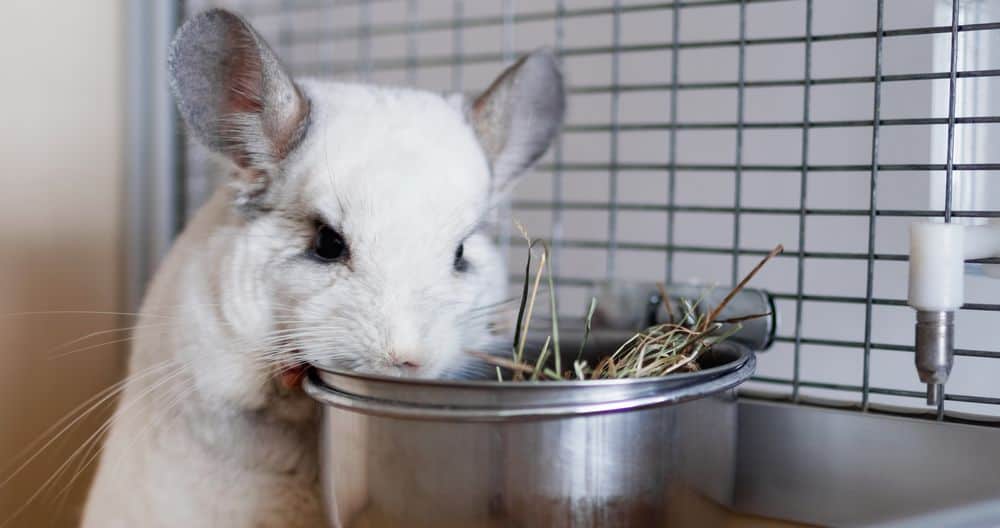
In the wild, chinchillas mainly eat a vegetarian diet. They forage on hay, roots, fresh grass and hay, leaves, herbs, the bark of trees, berries, nuts, and seeds.
If your Chinchilla were living in the wild, its diet would mainly constitute roughage. They are, after all, monogastric omnivores. Monogastric animals have simple, single-chambered stomachs.
Other examples of monogastric animals include horses, rabbits, etc. All these animals require a diet high in fiber. This also implies that chinchillas’ stomachs are not meant to handle rich, fatty food.
The diet you feed your Chin has to be rich in fiber. According to experts, you need to feed between 15 to 35% of fiber to your chinchilla daily. This fiber should mainly come from hay, like timothy and orchard hay.
Hay
In this regard, they are similar to guinea pigs. Both animals need a constant supply of hay all the time. As a rule of thumb, you may want to provide a pile of hay as big as your chinchilla’s body on a daily basis. I just keep the hay feeder full at all times
The other main component of its diet should be pellets. We’ll cover those below. You can supplement the hay and pellet diet with certain vegetables.
Can chinchillas eat celery and other similar vegetables. They can certainly have vegetables like carrot, kale, celery, alfalfa, and squash.
These vegetables provide them with many nutrients including fiber and water. However, they do not need these and get everything they need from hay and pellets.
Vegetables also contain sugars and other things that can cause trouble for a chin’s delicate digestive system, if they eat a lot of them. They should be given only as the occasional treat and never constitute more than a tiny part of a chin’s diet.
Chinchillas also require protein, which they get from the hay and pellets. In the wild, they forage on grass all day to acquire all the protein they need. In captivity, you can make sure your pet gets protein by providing the best quality hay and pellets.
When the weather turns cooler and there is not much grass or hay available, wild chinchillas often have no option but to consume insects, bugs, and even bird eggs. They eat bugs trapped in succulents like he aloe plant, which is abundant in the Andes.
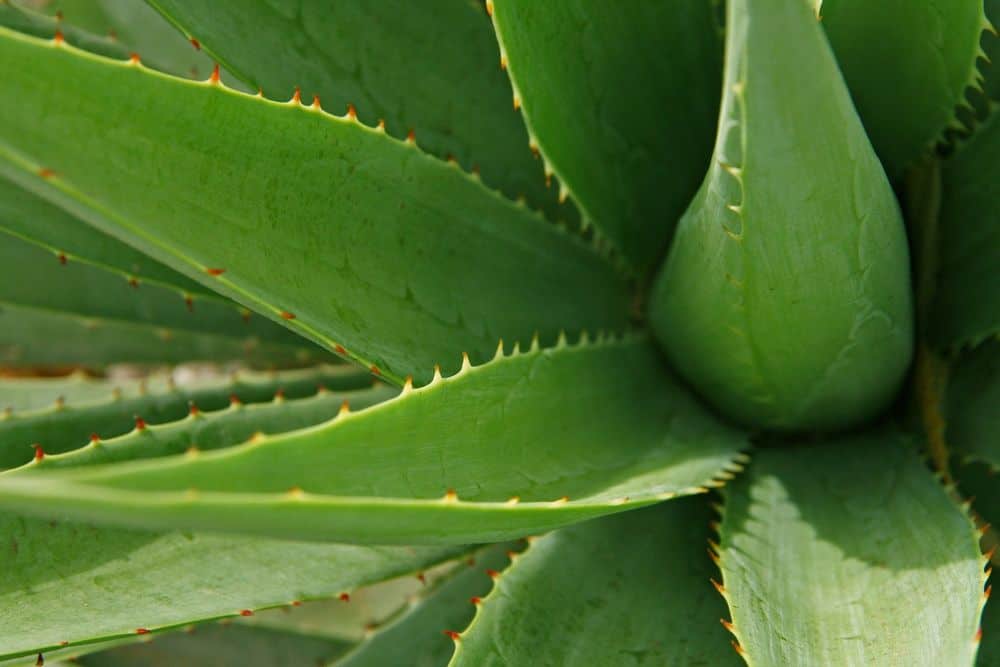
Andean chinchillas are even known to use resourceful methods when hunting for bird eggs. They use their sharp incisors to break the eggs open and suck the contents.
Based on this knowledge, scientists have now concluded that, although chinchillas are primarily vegetarians, wild chinchillas occasionally eat animal-based foods like bugs and insects, making them omnivores, as mentioned above.
This means that chinchilla owners can safely supplement their pet’s diet with fishmeal or dried mealworm larvae. But there is no need to do so. I just stick to hay and pellets with my chin. Why complicate things?
Pellets
As mentioned above, a chinchilla diet should mainly consist of hay and pellets. But what kind of pellets should you give your chinchilla.
This is where many people simply give their chin guinea pig pellets or pellets made for a rabbit. They figure the animals are closely related, so pellets that work for one should work for the other.
In many cases, that is even the recommendation you will get from a pet store employee. But what do you expect?
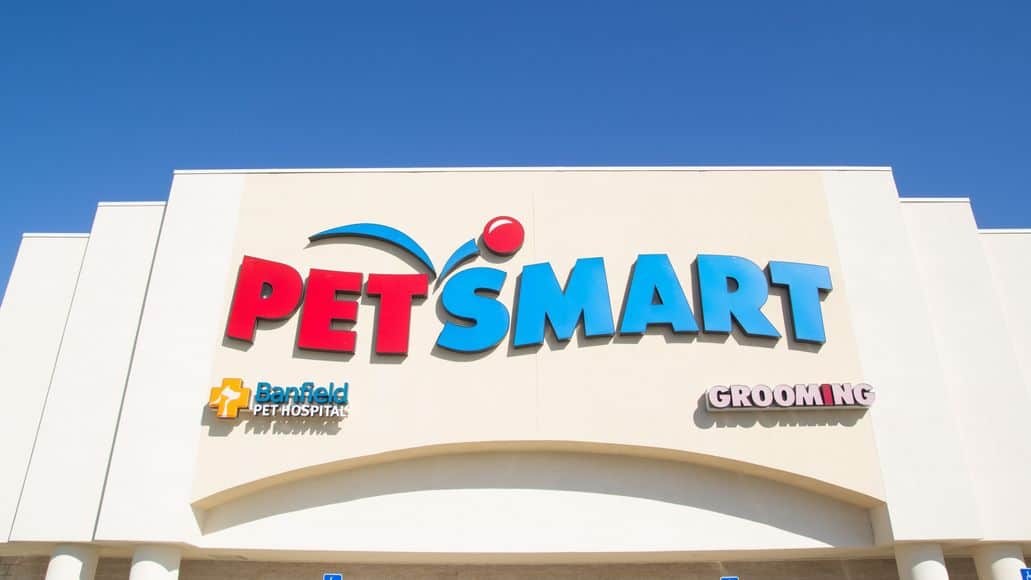
Pet stores serve all kinds of animals. The chances of encountering an employee who knows a lot, or even anything, about chinchillas is very slim.
If you ask for recommendations, they will just tell you to get any type of pellet made for small rodents. But as we covered already, you need pellets formulated specifically for chinchillas.
Read our article covering the best pellets made for chinchillas for help in finding good brands.
Stick To One Diet
It is very important that you stick to one type of food for your chin. If you want to make any changes, make them very slowly, over the course of a few days.
Add a small quantity of the new pellets to the old. Keep an eye on your pet’s poop. It should be firm and dry. If it appears wet and sticky, it’s digestive system is struggling and you’re probably changing the food too quickly. Or the new food simply isn’t going over well.
What Not To Feed Your Chinchilla
I mentioned above that some vegetables are fine, if fed in very small amounts. But there are other vegetables that you should avoid altogether. Here are some of those, along with some other foods to avoid.
- Asparagus
- Avocado
- Bananas
- Bread
- Broccoli
- Cabbage
- Corn
- Chocolate
- Cereals
- Nuts
- Sunflower seeds
These foods are all unnecessary and will cause problems for your pet. They al contain something that can be harmful, like sugar or fat. Some are fine in small amounts, but there is no good reason to feed them to your chin.
One exception may be some nuts or seeds. Chinchillas love to eat sunflower seeds, for example. But they are very high in fat, so it is best to avoid them. If you do want to give your chin a treat, limit it to one or two seeds, once a week.
Another exception are some less sugary cereals, as long as you only give your pet small amounts. For example, chinchillas can eat corn flakes, Cheerios or shredded wheat, with the latter being the best choice.
Chinchillas Eating Guinea Pig Food: Related Questions
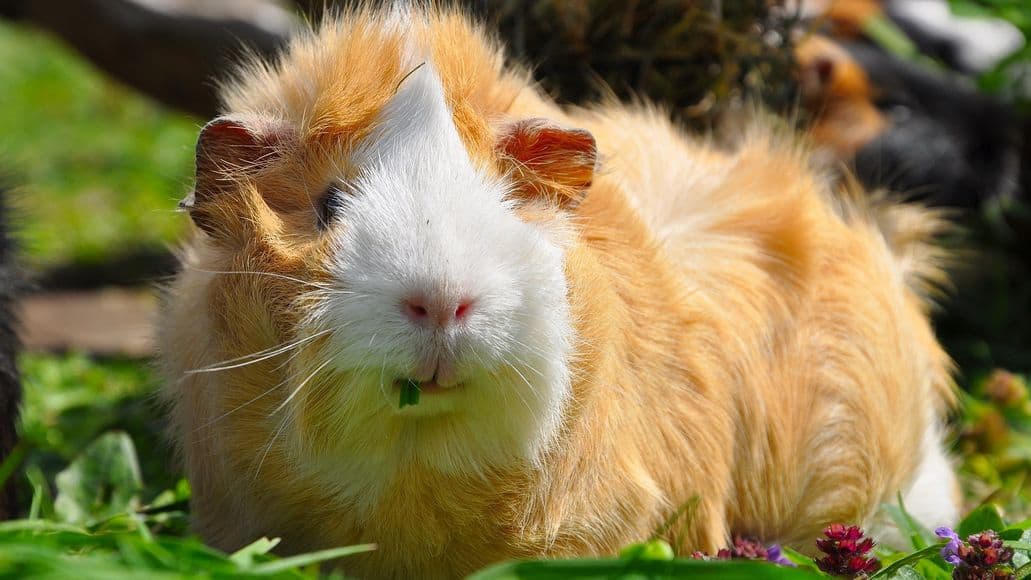
The following questions are ones I commonly get in relation to a chinchilla’s diet. If you have any other questions not answered here, feel free to ask them in the comments below.
Can Chinchillas Eat Rabbit Food?
No, chinchillas should not eat rabbit food. The two animals are different and have different nutritional requirements. Rabbit food is specifically tailored for rabbits and won’t provide your chinchilla with the nutrition it needs. Eating food meant for rabbits could even lead to digestive problems.
Can Chinchillas Eat Hamster Food?
Hamster food won’t kill your chinchilla but it also won’t provide it with the nutrition it needs. Moreover, hamster food could lead to soft stool and other stomach issues in your pet. Just like hamsters shouldn’t bathe in chinchilla dust, chinchillas shouldn’t eat hamster food.
Can Chinchillas Eat Gerbil Food?
Please refrain from feeding gerbil food to your chinchilla. It won’t provide your pet with sufficient nutrition and may lead to stomach problems.
Can You Keep Both Pets In The Same House?
You can, though you do not want to keep them in the same cage. In fact, it is best to keep them in separate rooms. Do guinea pigs and chinchillas get along at all, then? They get along fine most of the time, but if they are forced to compete for space, that could change.
Can Chinchillas Eat Human Food?
Huma food ancompasses a huge range of different things. Some are fine in small quantities, while others are completely off limits. Read What Human Food Can Chinchillas Eat for help in choosing the right ones.
Can Guinea Pigs Eat Chinchilla Food?
No, guinea pigs can not eat chinchilla food, at least not on a regular basis. Everything written above about chinchillas eating guinea pig food is also true in reverse. There is a reason each species has it own specially formulated food options.
Chinchilla Eating Guinea Pig Food: Final Thoughts
Guinea pig food is not harmful to a chinchilla. The problem is that it is not designed to meet a chinchilla’s nutritional requirements. In the long run, not getting all the nutrients it needs could lead to health problems for your chin.
That’s why you should always feed your pet food pellets made specifically for chinchillas, in addition to Timothy hay. This combination ensures it gets all the nutrients it needs to live a long, happy, healthy life.
Leave a Reply